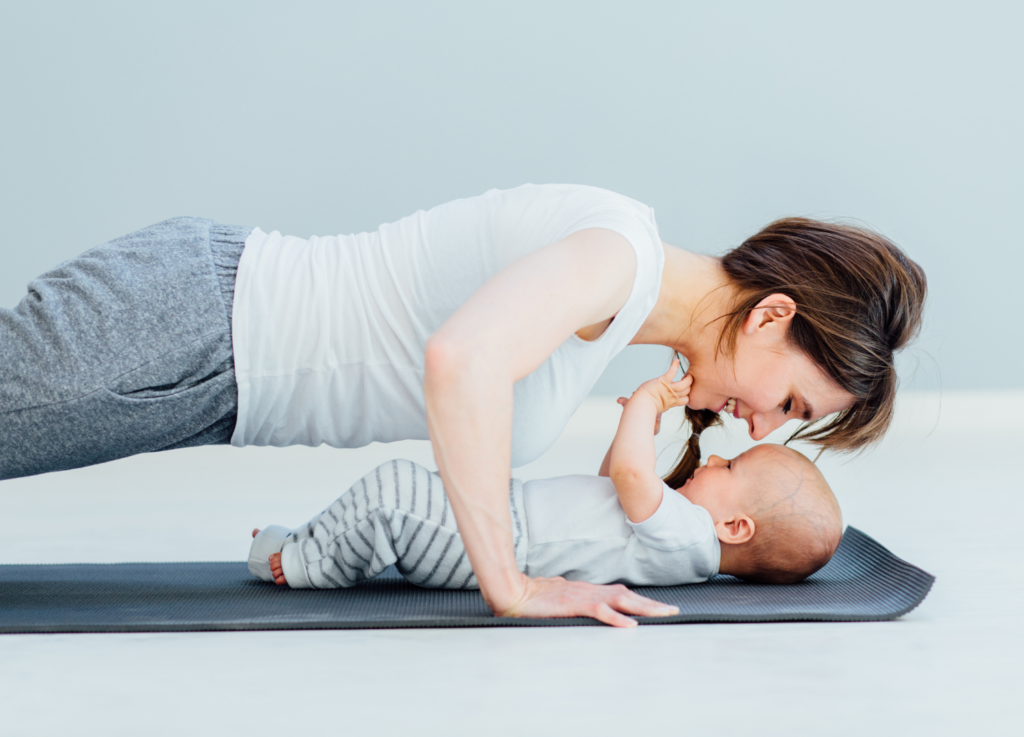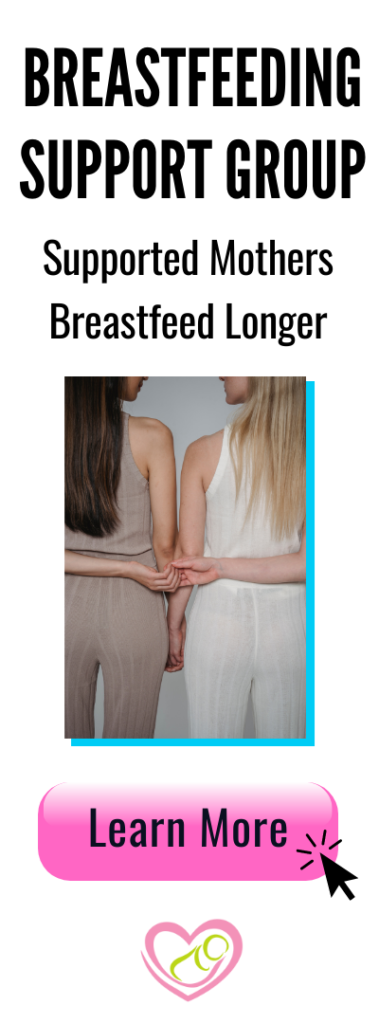Exercise And Breastfeeding- Tips & Advice
May 17, 2022 2024-06-20 17:19Exercise And Breastfeeding- Tips & Advice
Exercise And Breastfeeding- Tips And Advice

Exercise is incredibly important for both physical health and mental health. Staying active postpartum can really be beneficial to raise your endorphins and positive hormones to help you feel good.
Exercise Misconceptions
There are plenty of myths spread about the relationship between exercise and breastfeeding. Some new moms are wary of working out during this time because they believe that it lowers your milk supply, when in reality this is not the case! Another myth is that babies don’t like the taste of milk after you work out, but this is also has been disproven. This belief is likely derived from sweat making the breast milk taste saltier. If you are concerned about this, use a wet cloth to wipe the area prior to nursing.
When Can I Start Exercising?
Wait until your 6-week appointment to be checked out by your doctor and cleared for exercise. Especially if you have had a c-section, it is important to speak to your healthcare provider to make sure everything is healing well. Discuss with them what activities you plan on beginning!
Even though you should not begin a workout regimen until 6 weeks postpartum, this does not mean you cannot still stay active prior to this by going on walks outside.
Where Do I Start?
Like anytime you begin a new workout routine, you need to start small. Do not immediately rush right back into running marathons, even if that is something you were doing prior to giving birth. Start slowly, and gradually increase your workouts for best results and to decrease risks of injury. If you have unusual pain or bleeding, stop the workout and speak to your health care provider.
Stay Hydrated
It is so important to stay hydrated while exercising, especially if you are breastfeeding. When we sweat, we lose electrolytes and water in our body which need to be replenished to have your body run optimally. Keep a water bottle nearby while exercising (and while breastfeeding) to remind yourself to stay hydrated.
A lot of moms believe that blue Gatorade is great to have since it keeps you hydrated, but this is actually not the case. Sports drinks are high in calories, contain a lot of added sugars and artificial flavors. These drinks are really meant for high-performance athletes, not the everyday person. Water is the best way for us to stay hydrated (it does make up nearly 60% of our bodies!). If you are not the biggest fan of the flavor try adding lemons (which also contain electrolytes), strawberries, or cucumber to your water. For more information on electrolytes and hydration, check out our article here.
Can I Diet?
Breastfeeding is not the time to drastically cut calories. Since you are supporting another human with your milk, it is important that you are consuming enough to support yourself and your baby. However, this does not mean you cannot be conscious about what you are eating and in what amounts. Breastfeeding mothers burn an extra 300-500 calories a day through nursing, so this is also important to keep in mind! Make sure you are getting 2,000 to 2,500 calories a day. If you and your healthcare provider think it is best to have a lower caloric intake, make sure this is something you do gradually and do not go below 1,800 calories. A quick, drastic drop in calories or hydration will likely lower your milk supply. Rapid weight loss also can lead to fat-soluble environmental contaminants and toxins being released from lost fat into breast milk. It is generally safe for moms to lose up to 1.5lbs per week.
What Foods Should I Focus On?
Proper nutrition is as important as ever when breastfeeding! Protein is really important in keeping you satiated. Increasing your protein intake will help prevent the loss of muscle mass postpartum when you are unable to exercise, or unable to exercise as much as you used to. The CDC recommends nursing mothers consume around 71g of protein daily for the first year postpartum. Some great sources of protein include hard boiled eggs, almonds and Greek yogurt. Eating whole grains, and dietary fiber will also contribute to you staying fuller longer. Oatmeal is a great source of both fiber and protein, which is why so many people use it as a filling breakfast. And of course, leafy green vegetables will keep you full while also helping you meet your dietary requirements and nutritional needs.
To learn more about nutrition and what foods are important when breastfeeding, read our article here.
What You Wear Matters!
Get a sports bra that makes you feel supported, but not constrictive. If it is too compressing, it can cause clogged milk ducts, so be cautious! Take the bra off as soon as possible after working out to get rid of that constriction on the breasts. If you are finding that you are getting clogged ducts, it may mean you need a different sports bra.
Also, it is less comfortable to workout with full breasts, so it is actually a good idea to nurse or pump prior to your exercise. If your baby seems like they are not hungry, simply pump and store the milk for later. Full breasts can be painful enough on their own, don’t make yourself more uncomfortable by working out with them!
What Workouts Should I Do?
Like previously mentioned, you shouldn’t jump right into running marathons or doing CrossFit. Do some research on local mom walking groups in your area if you are interested. Another option is classes like Fit4Mom. The franchise offers 3 types of classes, one being a stroller stride (aka baby can come too!), and your first class is free. Don’t feel comfortable working out in a public space or group setting? That is totally okay. There are tons of online workouts you can do from home. You can also go on your own walks with your baby, and maybe incorporate some hills for a higher intensity. Resistance and cardiovascular workouts are great, but we do often forget that yoga is a workout too! It is great for postpartum when your body really needs stretching after giving birth, and you can also work on your breathing. There are some great baby and me yoga videos on YouTube! You can also consider downloading workout apps like Fit Mom, to inspire you through new home workouts and meal plans.
How Can I Incorporate Watching My Baby While Working Out?
Babywearing is a perfect way to be with your child while exercising. Having your baby attached to you while doing lunges, or even just going on a walk is a great exercise because they add resistance! Squats and good mornings are also perfect movements while baby wearing. There are also some exercises you can do while actually playing with your baby. For example, with your baby is laying on the ground, you can do a plank or push ups over them while talking to them and giving kisses. If you put your baby in a supported bouncer or car seat in between your legs, you also can do sit ups and tickle them each time you reach the top. Not into core workouts? Try laying on your back with your knees bent and lift the baby up and down to your chest for a good arm workout (guaranteed to make your baby smile as well!).
As your child gets older, you can also use this method to practice counting. Smile and count your sit-ups out loud and make the experience exciting for your baby or toddler. Swimming is another good exercise you can do with your baby. While your child is in their floater, you can practice treading water which is great for resistance and easy on the joints.
You’ve got this, Mama!
***The information provided on our website is intended solely for general educational and informational purposes only. It is neither intended nor implied to be a substitute for professional medical advice. Always seek the advice of your physician for any questions you may have regarding your or your child’s medical condition. Never disregard professional medical advice or delay in seeking it because of something you have received in this information.***
Search
baby bottle feeding breastfeeding breastfeeding latch breastfeeding pain breast milk storage breast refusal bugs cedar park regional clogged duct contraceptives daycare discharge doula engorgement exercise foremilk galactogogues hindmilk hospital how to latch baby labor low milk supply low supply massage mastitis newborn care nursing strike nutrition pacifiers plugged duct plugged ducts postpartum prenatal pumping relactation siblings sleep sore nipples breastfeeding suck training tax breaks thrush tongue tie video weaning
Search



